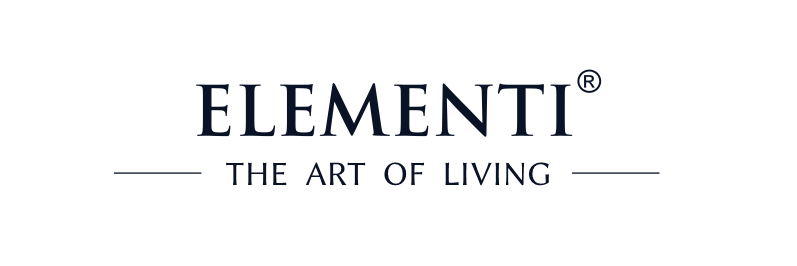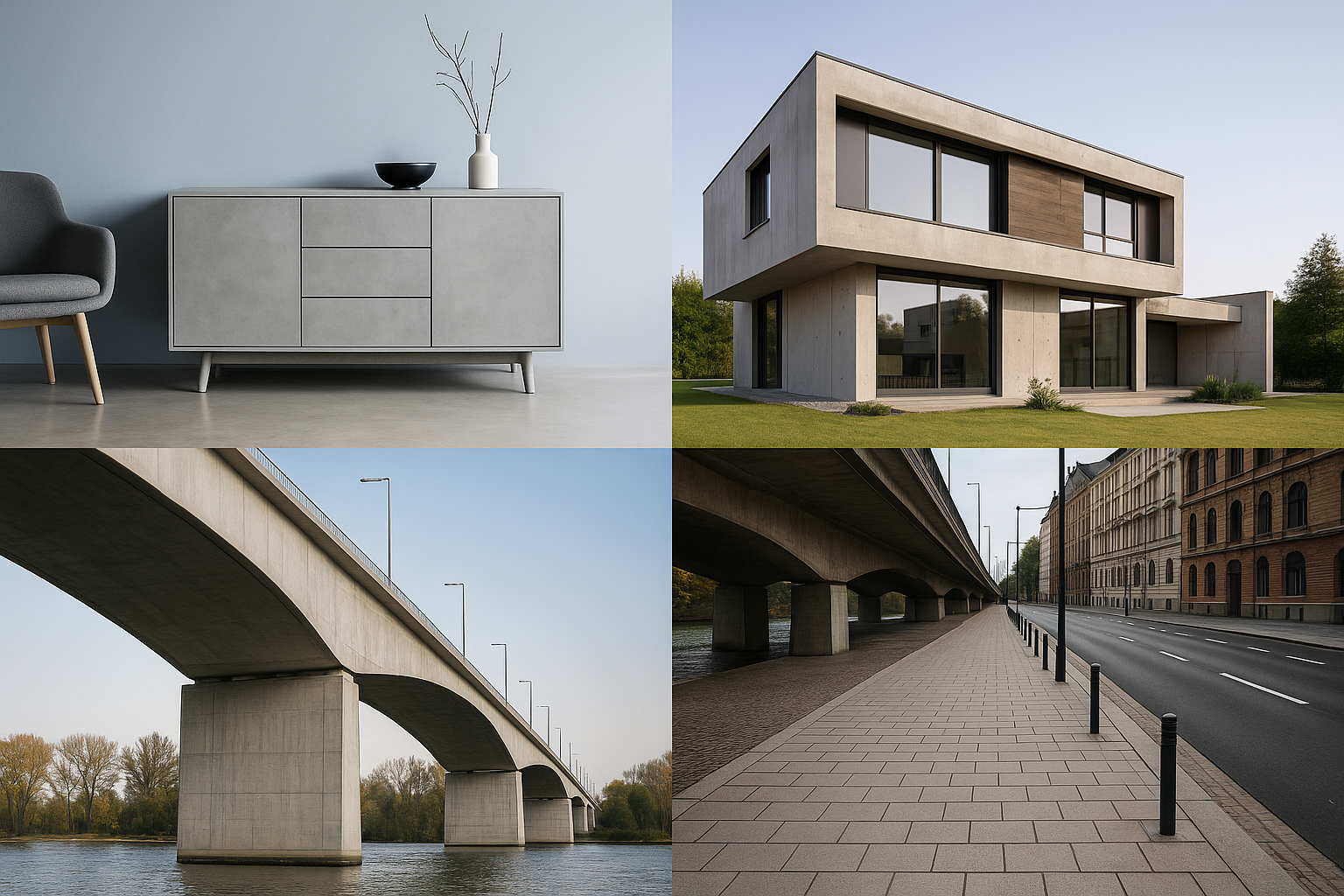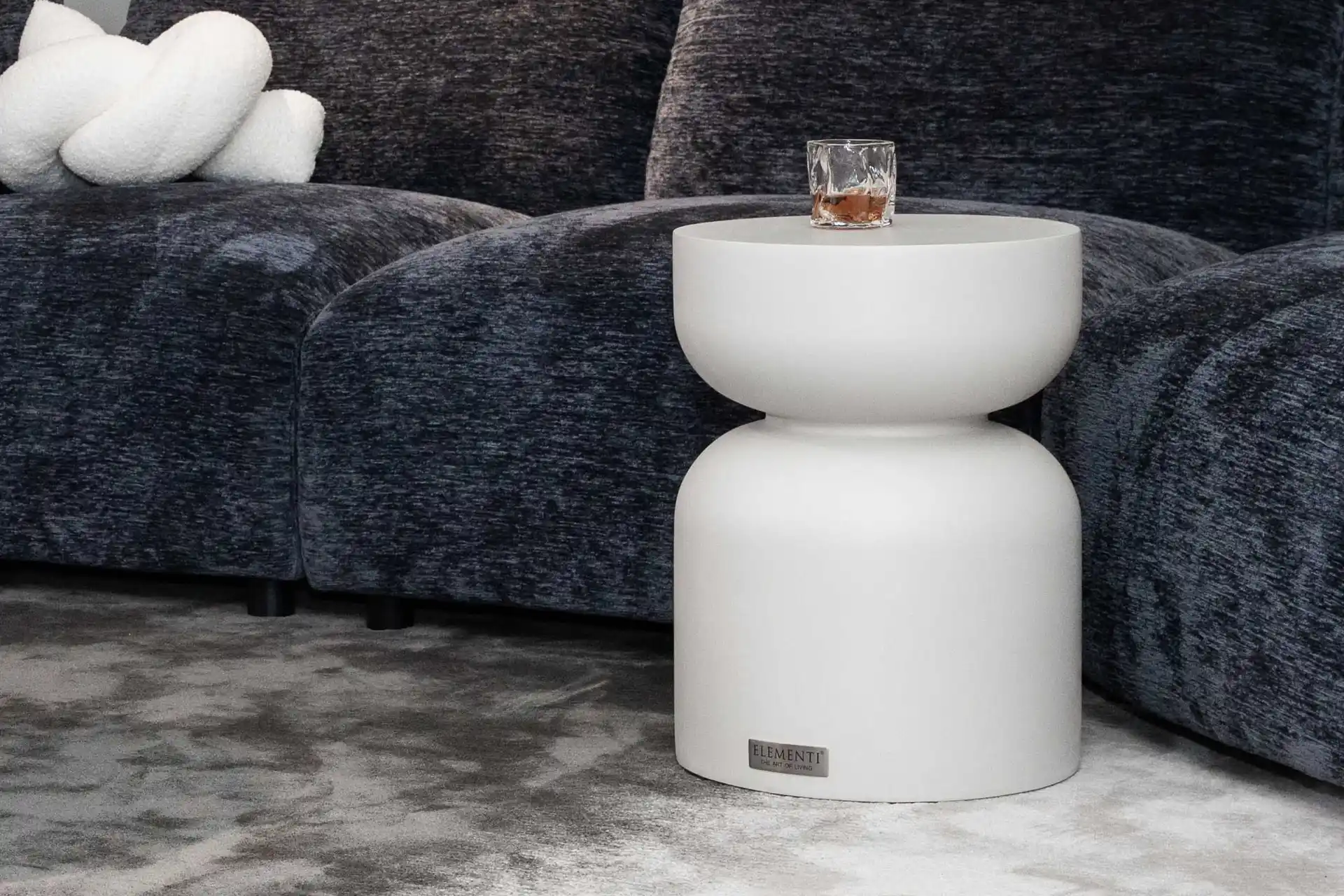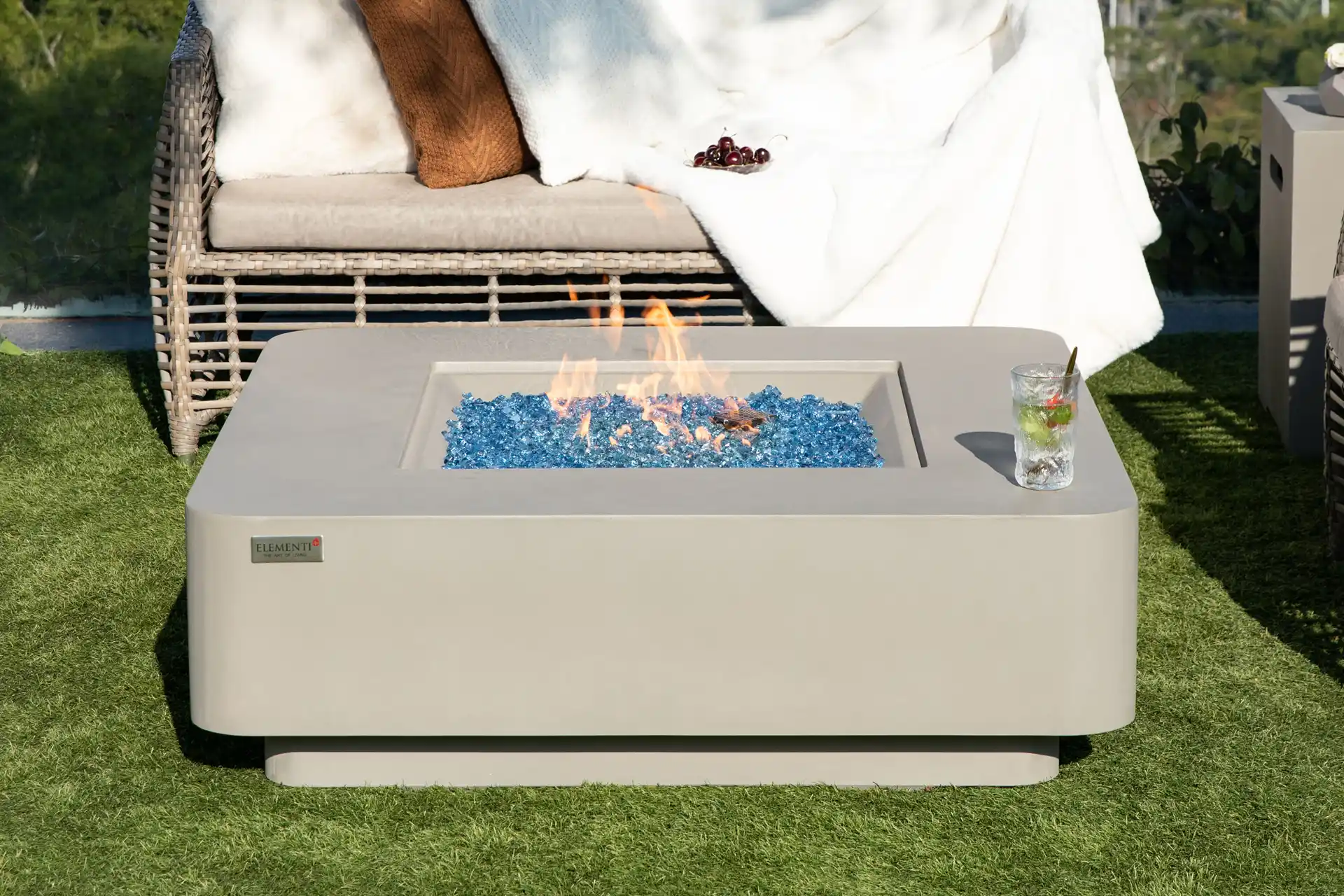1 A practical guide for consumers
In modern outdoor and interior design, concrete has long been more than just a “building material”. It is also an attitude: calm, stable, natural, durable. On the terrace, in the garden, in the dining area or around the fireplace, concrete lends rooms a sculptural presence.
This article explains in easy-to-understand terms why Beton and GFRC (glass fiber reinforced concrete) are ideal for furniture and fireplaces are ideal: What you should look out for when buying, what surfaces are available, how installation, use, spacing and maintenance work – and what looks are currently in demand in Europe.
2 The essence of concrete
Concrete is a multiphase composite material: cement “bonds” sand and gravel to form a dense, very stable material.
- Binder: Cement reacts with water and forms C-S-H gel – the actual “strength” of the concrete.
- Aggregate (sand/gravel, 70-80 % volume): characterizes stability, durability and feel.
- Water: enables mixing, molding and reaction.
- Additives/cement substitutes: make concrete denser, more durable and more sustainable.
For those who like it technical: 2C₃S + 6H → C₃S₂H₃ (C-S-H) + 3CH. C-S-H ensures strength and density; too much CH can reduce durability.
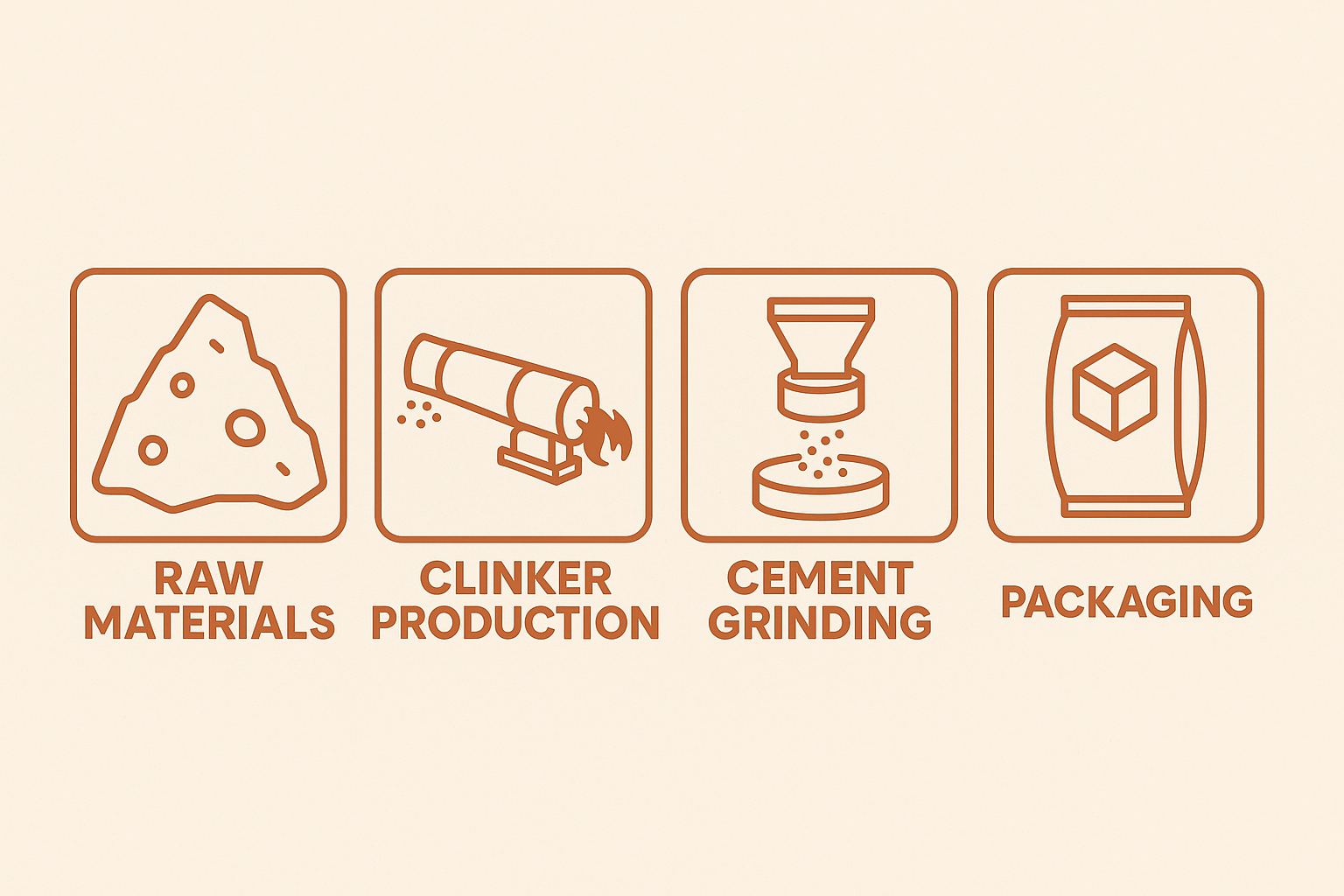
2.0.1 Typical characteristic values – what they bring you
| Characteristic | Typical area | Your benefit |
|---|---|---|
| Compressive strength | 30-80 MPa | very strong, durable |
| Bending tensile strength | 3-8 MPa | Edges/sheets tear less easily |
| Modulus of elasticity | 25-35 GPa | Dimensionally stable, “quiet” feel |
| Water absorption | fewer stains, easier to clean | |
| Bulk density | 2,300-2,500 kg/m³ | pleasant weight, wind-stable outdoor |
| Thermal conductivity | 0.8-1.2 W/m-K | Stable close to the flame, good feeling of safety |
Buying tip: The denser and less porous the Beton, the more elegant the appearance, the better the stain resistance and service life.
3 GFRC: lighter, more beautiful, more durable
GFRC (glass fiber reinforced concrete) is concrete that is reinforced with alkali-resistant glass fibers and polymers. The result: thin walls, low weight, high crack resistance – ideal for furniture and cladding for fireplaces.
3.0.1 Why this is ideal for your home
- Less weight: thin-walled construction – easier to move and assemble.
- Low cracking: fibers act like “invisible reinforcement” and hold microcracks together.
- Fine details: clear edges, soft radii, high-quality feel.
- Weatherproof: insensitive to sun, rain, heat/cold.
You can find out more about the properties and care of GFRC here: GFRC Beton – Properties & care.
3.0.2 Standard values
| Characteristic value | Normal concrete | GFRC |
|---|---|---|
| Compressive strength | 40 MPa | 60-90 MPa |
| Bending tensile strength | 5 MPa | 15-30 MPa |
| Bulk density | 2,400 kg/m³ | 2,000-2,200 kg/m³ |
| Recommended wall thickness | ≥ 50 mm | 10-25 mm |
| Crack widths | rather larger |
In short: GFRC ≈ 1/3 lighter, higher crack/flexural strength, more design freedom.
4 Look & feel: the surface makes the look
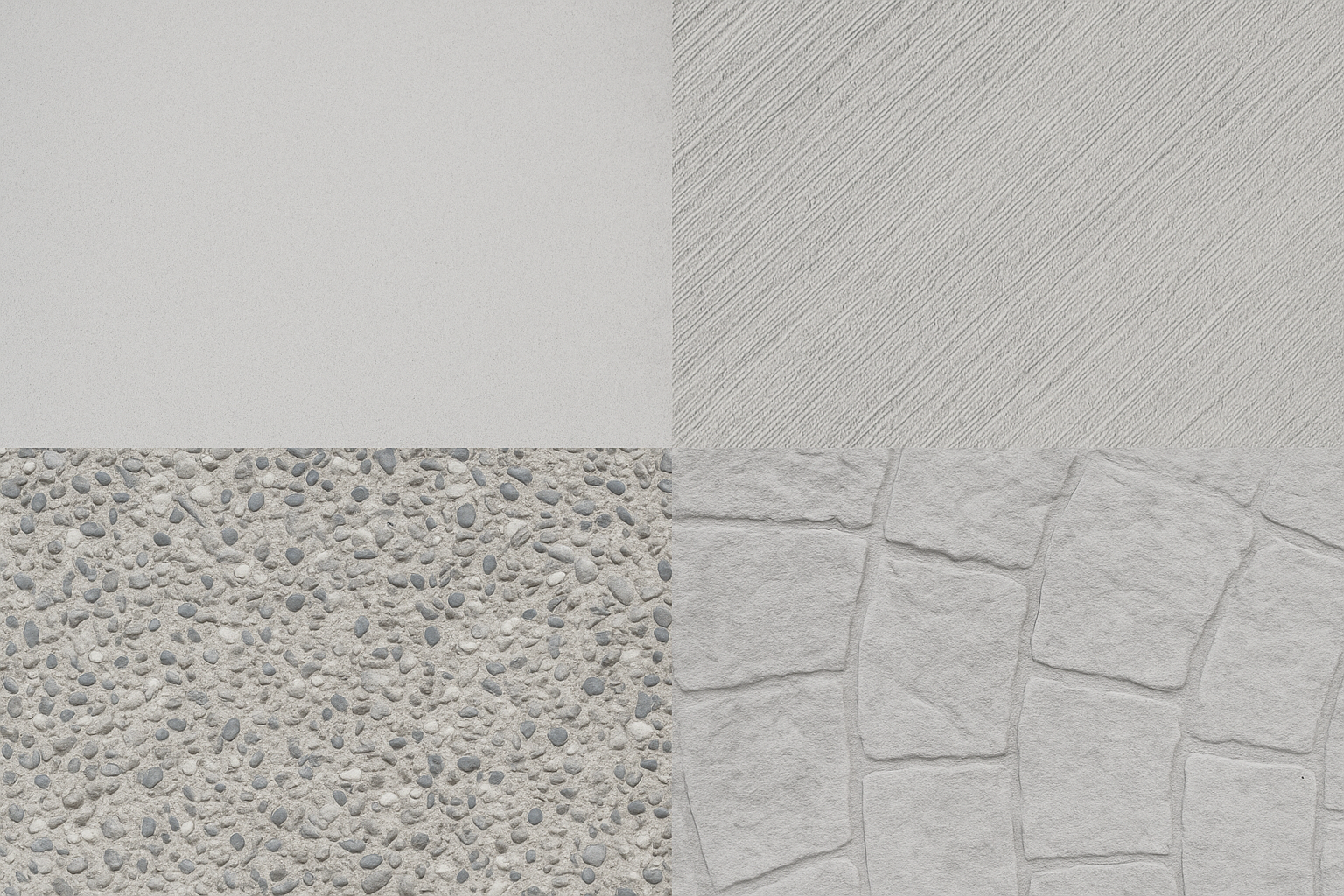
4.0.1 Popular surfaces
- Fair-faced concrete: smooth, low-porosity, very modern.
- Travertine/limestone look: natural pores and stone character.
- Finely bush-hammered/lightly sandblasted: matt, low reflections, velvety feel.
- Polished: easy-care for table tops; pay attention to scratch resistance.
- Colors: inorganic iron oxide pigments are recommended for UV stability. Classics: light/medium gray, sandstone, ivory.
- Sealing: Silane/Nano-SiO₂/Polyurethane – determines stain protection, water repellency, UV resistance.
Buying tips:
- Few pores, “calm” surfaces: exposed concrete or finely blasted.
- Stone look: travertine/limestone look + matt sealant.
- High scratch/stain resistance: hard top coats + easy routine maintenance.
5 Durability & safety: outdoors and near the flame
| Point | Standard value | Your advantage |
|---|---|---|
| Thermal conductivity | 0.8-1.2 W/m-K | Controlled surface temperatures, comfortable safety |
| Heat capacity | 900-1,000 J/kg-K | slower heating, pleasant feel |
| Fire protection | non-combustible, class A1 (depending on system) | very good as fireplace cladding |
| Freeze-thaw cycle | > 300 cycles (tight + airtight) | suitable for use in Europe in winter |
| Water absorption | Fewer stains, longer beauty | |
| Salt spray | depending on fittings/seals | on the coast/pool: Prefer stainless steel 316 & good sealing |
Note: For patios, gardens, the coast and near the flame – properly executed – concrete remains reliable and stable.
6 How concrete comes to your home: Furniture & fireplaces
6.1 Furniture(coffee table, side table, dining table, bench, planters/modules)
Advantages of concrete furniture
- Freedom of form: monolithic, sculptural, clean proportions.
- Stable feeling: everything stands still and secure.
- Easy-care: no pests, no moisture problems; additionally stain-resistant with sealant.
- Elegant mix of materials: concrete × wood (warm), metal (precise), ceramic/stone (fine) – suits modern and natural.
6.1.1 Sizes/structure (practical guidelines)
- Recommended wall thickness 15-20 mm (GFRC); table tops with 20-25 mm look particularly valuable.
- Reinforce locally at overhangs and cut-outs (internal ribs/doubling).
- Support large panels over the entire surface/linearly, not just selectively.
- Contact with the floor with glides/feet – protects edges and reduces capillary moisture.
6.1.2 Cleaning & care
- Everyday use: Neutral detergent + soft cloth.
- Stubborn: according to the specifications of the selected sealing system.
- Winter: Covering is recommended for a longer “as new” look.
6.2 Fireplaces(gas/ethanol: central, linear, built-in)
Concrete × Flame = Look + Rest
- Thermally stable: pleasant surface temperatures, solid envelope.
- Strong staging: round/angular/linear – the flame line always looks high-quality.
- Safety accessories: glass wind protection, lava stones or ceramic wood improve protection and atmosphere.
6.2.1 Construction & materials
- Inside near the flame: heat-resistant lining/binder-resistant liner.
- Outer shell: GFRC thin-walled + stiffened – light and rigid.
- Metal parts: 304/316 stainless steel (316 preferred on the coast).
- Sealing/drainage: no water accumulation, UV/heat-resistant sealants.
6.2.2 Installation & safety distances
- To combustible side surfaces: ≥ 60-90 cm (depending on power/wind protection).
- Free upwards or ensure sufficient dissipation of heat/smoke.
- To wooden railings/walls: ≥ 1.0-2.5 m (depending on model and standard).
- Substrate: non-combustible, level, load-bearing (natural stone/concrete slab).
- Gas: pipes properly; ethanol: fill and ventilate according to instructions.
You can find more tips on the selection and correct spacing of fireplaces in this article:Fireplace size guide.
6.2.3 Operation & maintenance
- Clean burner nozzles regularly.
- Keep the glass windscreen clean and undamaged.
- Check the seal every 6-12 months and maintain if necessary.
- Winter break: cover and close the gas supply.
7 Checklists & parameters
7.0.1 Material & pattern
- Target look: exposed concrete/travertine/matt/polished?
- Color: light/medium grey, sandstone, ivory? UV stability desired?
- Haptics/porosity: how much “mineral porosity” is desired?
- Sealing: stain protection/UV/water repellency & repairability.
- Sample: 300 × 300 mm in original thickness; check edge processing.
7.0.2 Construction & assembly
- Wall thickness: 15-20 mm (furniture/cladding), table tops 20-25 mm.
- Reinforcement: concealed ribs/reinforcements at load tips.
- Support: continuous + glides/feet as separation.
- Installation parts: Stainless steel A2/A4 to prevent rust discoloration.
- Substrate/drainage: Slope to the outside, no standing water.
7.0.3 Environment & Climate
- Frost region: Combination of density + air voids + sealing.
- Coast/salt spray: 316 stainless steel and meticulous sealing.
- High UV load: Sealing with increased UV resistance.
7.0.4 Maintenance
- Everyday use: Neutral detergent + soft cloth.
- Stains: treat according to the sealing system.
- Inspection: every 6-12 months, reseal if necessary.
- Winter: cover; avoid de-icing salt and hard friction.
8 Trends
- Mineral textures + neutral tones: light/medium gray, sandstone, ivory – timeless.
- Minimal & raw-noble: clear geometries + matt or travertine-like surface.
- Consistent material language: façade, flooring, furniture, fireplace – one system, one look.
- Lightweight & large format: GFRC enables large panels and long flame lines.
- Easy to maintain: preferably “repairable” sealants.
- Material mix: Beton × wood × metal × ceramic – warm/cool balance, high quality.
9 FAQ
Concrete does not stand for cold, but for stability, authenticity and durability. With GFRC, it becomes lighter, finer and even more robust – as furniture and as a fireplace shell. This is how your home finds the balance between sculpture and safety.
Used correctly, concrete is not just “a heavy object”, but an order and warmth that lasts for many years.
Concrete not only supports buildings – concrete also carries the temperament of your life.
